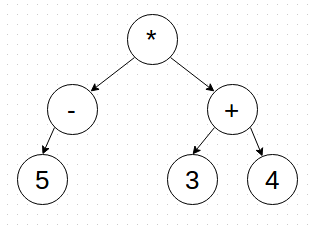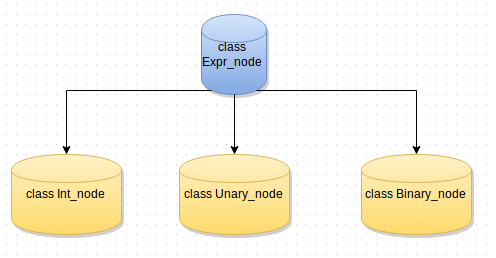An Example for OOP in C++
Contents
Generally, OOP( Object Oriented Progarmming) have three important elements:
- Abstraction of data
- Inheritance
- Dynamic Binding
Now, there is a demo for how to build an arithmetic expression-tree.

We want to build a node-tree like the tree in that picture to print a correct arithmetic expression.
Here you could see the relationship between the classes we used in our demo.

You know that the three classes Int_node, Unary_node and Binary_node are all inherit from the base class Expr_node.
Let’s look at the simple unary arithmetic expression (-5). In this expression, there is only one operand - and one integer 5. In expression ( 3 + 4), there are two integer and one operand.
We could find that there are only three different expression in representation of arithmetic expression. They are:
- Integer Expression
- Unary Expression
- Binary Expression
So, we find the common attributes on the three different types of expression and use a base-class Expr_node to represent this attribute.
If you have background in class handle, you may notice that class Expr is the handle for Expr_node.
We don’t need real objects of class Expr_node. What we need is the classes which inherit from that base-class. The meaning of the base-class is to provide the public interface.
|
|
You could run this program and will get the output like this one.

More Opeartion
We could evaluate the expression and add more types of node.
Here is the implementation. That’s cool!
|
|

Photo by Zhouyin in ShangHai, China

作者: Jason Leaster
来源: http://jasonleaster.github.io
链接: http://jasonleaster.github.io/2015/05/19/an-example-for-oop-in-c-plus-plus/
本文采用知识共享署名-非商业性使用 4.0 国际许可协议进行许可